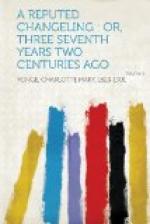This was very bad news, but Dr. Woodford knew not how to interfere; moreover, being in course at the Cathedral, he could not absent himself long enough for an expedition to Oakwood, through wintry roads in short days. He could only write an encouraging letter to the poor lad, and likewise one to Mr. Horncastle, who under the Indulgence had a chapel of his own. The Doctor had kept up the acquaintance formed by Peregrine’s accident, and had come to regard him with much esteem, and as likely to exercise a wholesome influence upon his patron. Nothing more was heard for a week, and then came another visitor to the Doctor’s door, Sir Peregrine himself, on his way down, at considerable inconvenience, to endeavour to prevail with his brother to allow him to retain his nephew in his suite.
“Surely,” he said, “my brother had enough of camps in his youth to understand that his son will be none the worse squire for having gone a little beyond Hampshire bogs, and learnt what the world is made of.”
“I cannot tell,” said Dr. Woodford; “I have my fears that he thinks the less known of the world the better.”
“That might answer with a heavy clod of a lad such as the poor youth who is gone, and such as, for his own sake and my brother’s, I trust the younger one is, fruges consumere natus; but as for this boy, dulness and vacancy are precisely what would be the ruin of him. Let my brother keep Master Robert at home, and give him Oakwood; I will provide for Perry as I always promised to do.”
“If he is wise he will accept the offer,” said Dr. Woodford; “but ’tis hard to be wise for others.”
“Nothing harder, sir. I would that I had gone home with Perry, but mine audience of his Majesty was fixed for the ensuing week, and my brother’s summons was peremptory.”
“I trust your honour will prevail,” said Mrs. Woodford gently. “You have effected a mighty change in the poor boy, and I can well believe that he is as a son to you.”
“Well, madam, yes—as sons go,” said the knight in a somewhat disappointing tone.
She looked at him anxiously, and ventured to murmur a hope so very like an inquiry, and so full of solicitous hope, that it actually unlocked the envoy’s reserve, and he said, “Ah, madam, you have been the best mother that the poor youth has ever had! I will speak freely to you, for should I fail in overcoming my brother’s prejudices, you will be able to do more for him than any one else, and I know you will be absolutely secret.”
Mrs. Woodford sighed, with forebodings of not long being able to aid any one in this world, but still she listened with earnest interest and sympathy.
“Yes, madam, you implanted in him that which yet may conquer his strange nature. Your name is as it were a charm to conjure up his better spirit.”
“Of course,” she said, “I never durst hope, that he could be tamed and under control all at once, but—” and she paused.




